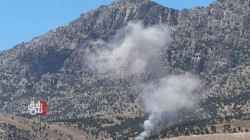Historic turning point? PKK disbandment could reshape Middle East politics

Shafaq News/ The Kurdistan Workers’ Party (PKK), long considered a major source of friction in Iraq-Turkiye relations, is reportedly on the verge of disbanding, in what could mark a “historic turning point” in a decades-old conflict with wide regional consequences, Middle East Eye reported.
The UK-based outlet cited indications that the PKK may soon formally abandon armed struggle, a move triggered by a recent call from its imprisoned leader Abdullah Öcalan to dissolve the group. The decision, if confirmed, would raise key questions about the fate of PKK fighters entrenched in Iraq’s Qandil Mountains, the party’s stronghold for years.
According to the report, a PKK disbandment could significantly reconfigure relations between Ankara, Baghdad, and Erbil, particularly as the group has long complicated Iraqi sovereignty and regional stability.
Turkiye’s evolving approach toward the PKK reportedly intensified after the Gaza war in October 2023 and the fall of al-Assad regime in Syria, which weakened Iran-aligned factions across the region. As Ankara adjusted its strategy, it expanded air and ground operations deep into Iraqi territory, including al-Sulaimaniyah and Sinjar, under its "preemptive counterterrorism" doctrine—drawing repeated criticism from Baghdad.
Yet, Iraq’s government—previously reluctant to confront the PKK directly—banned the group in 2023, reportedly in response to Turkiye’s persistent pressure and unilateral military actions inside Iraq.
The report noted that disarming the PKK could defuse tensions along the Iraq-Turkiye border, potentially paving the way for Turkish troop withdrawals. Iraq’s National Security Advisor Qasim al-Araji previously stated that Turkish military presence in Iraq is justified primarily by the PKK’s activities—implying that a resolution would remove that rationale.
Furthermore, the report suggested a likely dissolution of tactical ties between the PKK and Iran, amid growing Turkish concerns over Tehran’s use of armed proxies to curb Ankara’s regional influence.
It described disarmament as a potential boon for the Kurdistan Region, where PKK activities have hindered local governance, displaced villagers, and undermined KDP-PKK relations. The party has clashed with Peshmerga forces, and its targeting of the Kurdistan Democratic Party (KDP)—a key Turkish ally—has eroded the KDP’s standing.
Relations between the PKK and the Patriotic Union of Kurdistan (PUK) have also drawn Ankara’s ire, especially given the PKK’s footprint in PUK-controlled al-Sulaimaniyah. Turkiye’s closure of its airspace to flights from the city was a visible sign of this tension.
Still, the report quoted a senior Kurdish political figure as expressing cautious optimism about disarmament efforts, saying, “The PKK has harmed us more than it has harmed Turkiye.”
According to Middle East Eye, Turkish officials acknowledge the positive role of Kurdish leaders in the disarmament push, which appears to enjoy broad domestic support in the Kurdistan Region.
The KDP, in particular, could benefit by shedding the political baggage of its cooperation with Turkiye and regaining ground within Kurdish nationalist circles. Meanwhile, any disarmament trajectory is expected to lay the groundwork for Kurdish dialogue between Iraqi and Syrian factions, though ideological and territorial divisions will likely continue to shape political competition.
In conclusion, the report noted that PKK disarmament could facilitate rapprochement between the KDP and PUK, and between Ankara and al-Sulaimaniyah—but warned that historical rivalries and spheres of influence will remain decisive factors in shaping regional politics in the months and years ahead.





